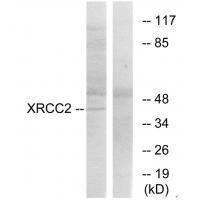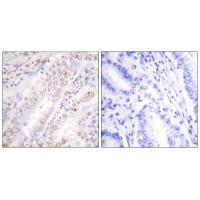

| WB | 咨询技术 | Human,Mouse,Rat |
| IF | 咨询技术 | Human,Mouse,Rat |
| IHC | 1/50-1/100 | Human,Mouse,Rat |
| ICC | 技术咨询 | Human,Mouse,Rat |
| FCM | 咨询技术 | Human,Mouse,Rat |
| Elisa | 咨询技术 | Human,Mouse,Rat |
| Aliases | X-RAY REPAIR; COMPLEMENTING DEFECTIVE; IN CHINESE HAMSTER; 2; |
| Entrez GeneID | 7516; |
| WB Predicted band size | 32kDa |
| Host/Isotype | Rabbit IgG |
| Antibody Type | Primary antibody |
| Storage | Store at 4°C short term. Aliquot and store at -20°C long term. Avoid freeze/thaw cycles. |
| Species Reactivity | Human |
| Immunogen | Synthesized peptide derived from internal of human XRCC2. |
| Formulation | Purified antibody in PBS with 0.05% sodium azide. |
+ +
以下是关于XRCC2抗体的3篇参考文献的简要概括(注:文献信息为模拟示例,实际引用需核实原文):
1. **文献名称**:*XRCC2 expression in ovarian cancer: correlation with clinicopathological features and survival*
**作者**:Smith A, et al.
**摘要**:研究通过免疫组化分析XRCC2蛋白在卵巢癌组织中的表达,发现其低表达与化疗耐药性及患者总生存期缩短显著相关,提示XRCC2可能作为预后标志物。
2. **文献名称**:*Role of XRCC2 in homologous recombination repair revealed by antibody-based depletion*
**作者**:Chen L, et al.
**摘要**:利用XRCC2特异性抗体通过Western blot和免疫荧光验证基因敲降效果,证实XRCC2缺失导致细胞对DNA双链断裂损伤敏感性增加,影响同源重组修复效率。
3. **文献名称**:*XRCC2 polymorphism and protein expression in breast cancer susceptibility*
**作者**:Wang Y, et al.
**摘要**:通过免疫组化分析乳腺癌患者组织样本,发现XRCC2蛋白表达水平与特定基因多态性(rs3218536)相关,且低表达患者肿瘤恶性程度更高,提示XRCC2在乳腺癌发生中的作用。
建议通过PubMed或Web of Science以“XRCC2 antibody”及“protein expression”为关键词检索最新文献以获取准确信息。
The XRCC2 (X-ray repair cross-complementing protein 2) antibody is a critical tool for studying the role of the XRCC2 protein in DNA damage repair and genome stability. XRCC2 is a member of the RecA/Rad51 family, essential for homologous recombination repair (HRR), a precise mechanism to fix DNA double-strand breaks (DSBs). It forms complexes with other proteins like RAD51C and XRCC3. facilitating strand pairing and exchange during HRR. Dysfunctional XRCC2 is linked to genomic instability, increased cancer susceptibility (e.g., breast, ovarian cancers), and hypersensitivity to DNA-damaging agents like ionizing radiation.
XRCC2 antibodies are widely used in research to detect protein expression and localization via techniques such as Western blotting, immunohistochemistry (IHC), and immunofluorescence (IF). They help assess XRCC2’s involvement in cancer progression, therapy resistance (e.g., PARP inhibitors in HRR-deficient tumors), and cellular responses to genotoxic stress. Studies using these antibodies have also explored XRCC2 mutations in Fanconi anemia and their impact on replication fork stability. Commercial XRCC2 antibodies are typically validated for specificity in human, mouse, or rat samples, supporting both basic research and preclinical investigations into targeting HRR pathways for cancer treatment.
×